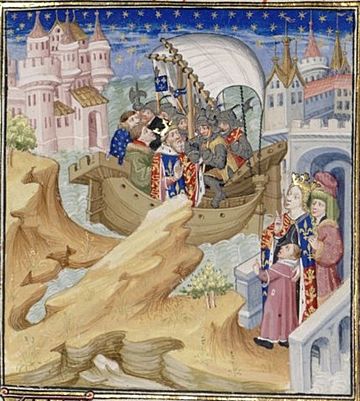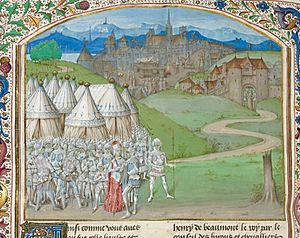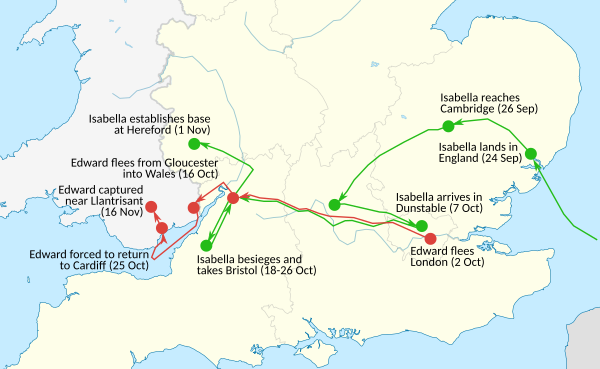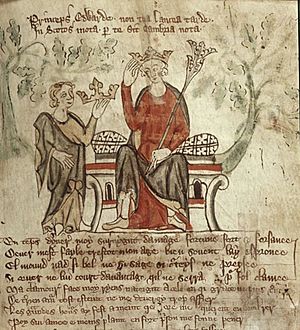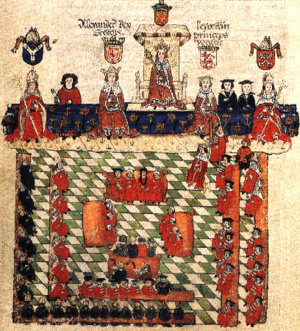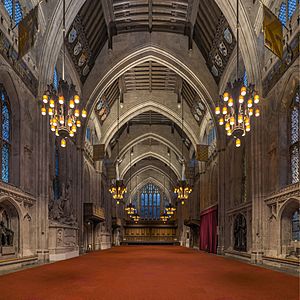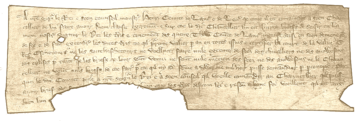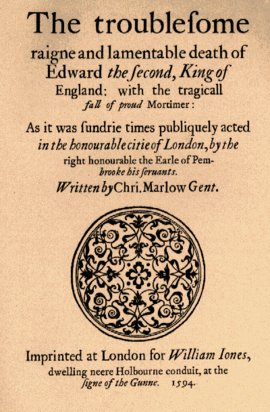Parliament of 1327 facts for kids
The Parliament of 1327, which sat at the Palace of Westminster between 7 January and 9 March 1327, was instrumental in the transfer of the English Crown from King Edward II to his son, Edward III. Edward II had become increasingly unpopular with the English nobility due to the excessive influence of unpopular court favourites, the patronage he accorded them, and his perceived ill-treatment of the nobility. By 1325, even his wife, Queen Isabella, despised him. Towards the end of the year, she took the young Edward to her native France, where she entered into an alliance with the powerful and wealthy nobleman Roger Mortimer, who her husband previously had exiled. The following year, they invaded England to depose Edward II. Almost immediately, the King's resistance was beset by betrayal, and he eventually abandoned London and fled west, probably to raise an army in Wales or Ireland. He was soon captured and imprisoned.
Isabella and Mortimer summoned a parliament to confer legitimacy on their regime. The meeting began gathering at Westminster on 7 January, but little could be done in the absence of the King. The fourteen-year-old Edward was proclaimed "Keeper of the Realm" (but not yet king), and a parliamentary deputation was sent to Edward II asking him to allow himself to be brought to parliament. He refused, and the parliament continued without him. The King was accused of offences ranging from the promotion of favourites to the destruction of the church, resulting in a betrayal of his coronation oath to the people. These were known as the "Articles of Accusation". The City of London was particularly aggressive in its attacks on Edward II, and its citizens may have helped intimidate those attending the parliament into agreeing to the King's deposition, which occurred on the afternoon of 13 January.
On or around 21 January, the Lords Temporal sent another delegation to the King to inform him of his deposition, effectively giving Edward an ultimatum: if he did not agree to hand over the crown to his son, then the lords in parliament would give it to somebody outside the royal family. King Edward wept but agreed to their conditions. The delegation returned to London, and Edward III was proclaimed king immediately. He was crowned on 1 February 1327. In the aftermath of the parliamentary session, his father remained imprisoned, being moved around to prevent attempted rescues; he died—presumed killed, probably on Mortimer's orders—that September. Crises continued for Mortimer and Isabella, who were de facto rulers of the country, partly because of Mortimer's own greed, mismanagement, and mishandling of the new king. Edward III led a coup d'état against Mortimer in 1330, overthrew him, and began his personal rule.
Contents
Background
King Edward II of England had court favourites who were unpopular with his nobility, such as Piers Gaveston and Hugh Despenser the Younger. Gaveston was killed during an earlier noble rebellion against Edward in 1312, and Despenser was hated by the English nobility. Edward was also unpopular with the common people due to his repeated demands from them for unpaid military service in Scotland. None of his campaigns there were successful, and this led to a further decline in his popularity, particularly with the nobility. His image was further diminished in 1322 when he executed his cousin, Thomas, Earl of Lancaster, and confiscated the Lancaster estates. Historian Chris Given-Wilson has written how by 1325 the nobility believed that "no landholder could feel safe" under the regime. This distrust of Edward was shared by his wife, Isabella of France, who believed Despenser responsible for poisoning the King's mind against her. In September 1324 Queen Isabella had been publicly humiliated when the government declared her an enemy alien, and the King had immediately repossessed her estates, probably at the urging of Despenser. Edward also disbanded her retinue. Edward had already been threatened with deposition on two previous occasions (in 1310 and 1321). Historians agree that hostility towards Edward was universal. W. H. Dunham and C. T. Wood ascribed this to Edward's "cruelty and personal faults", suggesting that "very few, not even his half-brothers or his son, seemed to care about the wretched man" and that none would fight for him. A contemporary chronicler described Edward as rex inutilis, or a "useless king".
France had recently invaded the Duchy of Aquitaine, then an English royal possession. In response, King Edward sent Isabella to Paris, accompanied by their thirteen-year-old son, Edward, to negotiate a settlement. Contemporaries believed she had sworn, on leaving, never to return to England with the Despensers in power. Soon after her arrival, correspondence between Isabella and her husband, as well between them and her brother King Charles IV of France and Pope John XXII, effectively disclosed the royal couple's increasing estrangement to the world. A contemporary chronicler reports how Isabella and Edward became increasingly scathing of each other, worsening relations. ..... This was public knowledge in England by March 1326, and the King openly considered a divorce. He demanded that Isabella and Edward return to England, which they refused to do: "she sent back many of her retinue but gave trivial excuses for not returning herself" noted her biographer, John Parsons. Their son's failure to break with his mother angered the King further. Isabella became more strident in her criticisms of Edward's government, particularly against Walter de Stapledon, Bishop of Exeter, a close associate of the King and Despenser. King Edward alienated his son by putting the prince's estates under royal administration in January 1326, and the following month the King ordered that both he and his mother be arrested on landing in England.
While in Paris, the Queen became the head of King Edward's exiled opposition. Along with Mortimer, this group included Edmund of Woodstock, Earl of Kent, Henry de Beaumont, John de Botetourt, John Maltravers and William Trussell. All were united by hatred of the Despensers. Isabella portrayed her and Prince Edward as seeking refuge from her husband and his court, both of whom she claimed were hostile to her, and claimed protection from Edward II. King Charles refused to countenance an invasion of England; instead, the rebels gained the Count of Hainaut's backing. In return, Isabella agreed that her son would marry the Count's daughter Philippa. This was a further insult to Edward II, who had intended to use his eldest son's marriage as a bargaining tool against France, probably intending a marriage alliance with Spain.
Invasion of England
From February 1326 it was clear in England that Isabella and Mortimer intended to invade. Despite false alarms, large ships, as a defensive measure, were forbidden from leaving English ports, and some were pressed into royal service. King Edward declared war on France in July; Isabella and Mortimer invaded England in September, landing in Suffolk on the 24th. The commander of the royal fleet assisted the rebels: the first of many betrayals Edward II suffered. Isabella and Mortimer soon found they had significant support among the English political class. They were quickly joined by Thomas, Earl of Norfolk, the King's brother, accompanied by Henry, Earl of Leicester (brother of the executed Earl of Lancaster), and soon afterwards arrived the Archbishop of Canterbury and the Bishops of Hereford and Lincoln. Within the week, support for the King had dissolved, and, accompanied by Despenser, he deserted London and travelled west. Edward's flight to the west precipitated his downfall. Historian Michael Prestwich describes the King's support as collapsing "like a building hit by an earthquake". Edward's rule was already weak, and "even before the invasion, along with preparation, there had been panic. Now there was simply panic".
King Edward's attempt to raise an army in South Wales was to no avail, and he and Despenser were captured on 16 November 1326 near Llantrisant. This, along with the unexpected swiftness with which the entire regime had collapsed, forced Isabella and Mortimer to wield executive power until they made arrangements for a successor to the throne. The King was incarcerated by the Earl of Leicester, while those suspected of being Despenser spies or supporters of the King—particularly in London, which was aggressively loyal to the Queen—were murdered by mobs.
Isabella spent the last months of 1326 in the West Country, and while in Bristol witnessed the hanging of Despenser's father, the Earl of Winchester on 27 October. Despenser himself was captured in Hereford and executed there within the month. In Bristol Isabella, Mortimer and the accompanying lords discussed strategy. Not yet possessing the Great Seal, on 26 October they proclaimed the young Edward guardian of the realm, declaring that "by the assent of the whole community of the said kingdom present there, they unanimously chose [Edward III] as keeper of the said kingdom". He was not yet officially declared king. The rebels' description of themselves as a community deliberately harked back to the reform movement of Simon de Montfort and the baronial league, which had described its reform programme as being of the community of the realm against Henry III. Claire Valente has pointed out how, in reality, the most common phrase heard "was not 'the community of the realm', but 'the quarrel of the earl of Lancaster'", illustrating how the struggle was still a factional one within baronial politics, whatever cloak it may have appeared to possess as a reform movement.
By 20 November 1326 the Bishop of Hereford had retrieved the Great Seal from the King, and delivered it to the King's son. He could now be announced as his father's heir apparent. Although, at this stage, it might still have been possible for Edward II to remain king, says Ormrod, "the writing was on the wall".
Summoning of parliament
Isabella, Mortimer and the lords arrived in London on 4 January 1327. In response to the previous year's spate of murders, Londoners had been forbidden to bear arms, and two days later all citizens had sworn an oath to keep the peace. Parliament met on 7 January to consider the state of the realm now the King was incarcerated. It had originally been summoned by Isabella and the Prince, in the name of the King, on 28 October the previous year. Parliament had been intended to assemble on 14 December 1326, but on 3 December—still in the name of the King—further writs were issued deferring the sitting until early the next year. This, it was implied, was due to the King being abroad, rather than imprisoned. Because of this, parliament would have to be held before the Queen and Prince Edward. The History of Parliament Trust has described the legality of the writs as being "highly questionable", and C. T. Wood called the sitting "a show of pseudo-parliamentary regularity", "stage-managed" by Mortimer and Thomas, Lord Wake. For Isabella and Mortimer, governing through parliament was only a temporary solution to a constitutional problem, because at some point their positions would likely be challenged legally. Thus, suggests Ormrod, they had to enforce a solution favourable to Mortimer and the Queen, by any means they could.
Contemporaries were uncertain as to the legality of Isabella's parliament. Edward II was still king, although in official documents, this was only alongside his "most beloved consort Isabella queen of England" and his "firstborn son keeper of the kingdom", in what Phil Bradford called as a "nominal presidency". King Edward was said to be abroad when in reality he was imprisoned in Kenilworth Castle. It was maintained that he desired a "colloquium" and a "tractatum" (conference and consultation) with his lords "upon various affairs touching himself and the state of his kingdom", hence the holding of parliament. Supposedly it was Edward II himself who postponed the first sitting until January, "for certain necessary causes and utilities", presumably at the behest of the Queen and Mortimer.
A priority for the new regime was deciding what to do with Edward II. Mortimer considered holding a state trial for treason, in the expectation of a guilty verdict and a death sentence. He and other lords discussed the matter at Isabella's Wallingford Castle just after Christmas, but with no agreement. The Lords Temporal affirmed that Edward had failed his country so gravely that only his death could heal it; the attending bishops, on the other hand, held that whatever his faults, he had been anointed king by God. This presented Isabella and Mortimer with two problems. First, the bishops' argument would be popularly understood as risking the wrath of God. Second, public trials always bring the danger of an unintended verdict, particularly as it seems likely a broad body of public opinion doubted whether an anointed king could even commit treason. Such a result would mean not only Edward's release but his restoration to the throne. Mortimer and Isabella sought to avoid a trial and yet keep Edward II imprisoned for life. The King's imprisonment (officially by his son) had become public knowledge, and Isabella's and Mortimer's hand was forced as the arguments for the young Edward being named keeper of the kingdom were now groundless (as the King had clearly returned to his realm—one way or another).
Attendance
No parliament had sat since November 1325. Only 26 of the 46 barons who had been summoned in October 1326 for the December parliament were then also summoned to that of January 1327, and six of those had never received summonses under Edward II at all. Officially, the instigators of the parliament were the Bishops of Hereford and Winchester, Roger Mortimer and Thomas Wake; Isabella almost certainly played a background role. They summoned, as Lords Spiritual, the Archbishop of Canterbury and fifteen English and four Welsh bishops as well as nineteen abbots. The Lords Temporal were represented by the Earls of Norfolk, Kent, Lancaster, Surrey, Oxford, Atholl and Hereford. Forty-seven barons, twenty-three royal justices, and several knights and burgesses were summoned from the shires and the Cinque Ports. They may well have been encouraged, suggests Maddicott, by the wages to be paid to those attending: the "handsome sum" of four shillings a day for a knight and two for a burgess. The knights provided the bulk of Isabella's and the Prince's vocal support; they included Mortimer's sons, Edward, Roger and John. Sir William Trussell was appointed procurator, or Speaker, despite his not being an elected member of parliament. Although the office of procurator was not new, the purpose of Trussell's role set a constitutional precedent, as he was authorised to speak on behalf of parliament as a body. A chronicle describes Trussell as one "who cannot disagree with himself and, [therefore], shall ordain for all". There were fewer lords present than were traditionally summoned, which increased the influence of the Commons. This may have been a deliberate strategy on behalf of Isabella and Mortimer, who, suggests Dodd, would have known well that in the occasionally tumultuous parliaments of earlier reigns, "the trouble that had been caused in parliament had emanated almost exclusively from the barons". The Archbishop of York, who had been summoned to the December parliament, was "conspicuous by his absence" from the January sitting. Some Welsh MPs also received summonses, but these had deliberately been despatched too late for those elected to attend; others, such as the sheriff of Meirionnydd, Gruffudd Llwyd, refused to attend, out of loyalty to Edward II and also hatred of Roger Mortimer.
Although a radical gathering, the parliament was to some degree consistent with previous assemblies, being dominated by lords reliant on a supportive Commons. It differed, though, in the greater-than-usual influence that outsiders and commoners had, such as those from London. The January–February parliament was geographically broader too, as it contained unelected members from Bury St Edmunds and St Albans: says Maddicott, "those who planned the deposition reached out in parliament to those who had no right to be there". And, says Dodd, the rebels deliberately made parliament "centre stage" to their plans.
Parliament assembled
The King's absence
Before parliament met, the lords had sent Adam Orleton (the Bishop of Hereford) and William Trussell to Kenilworth to see the King, with the intention of persuading Edward to return with them and attend parliament. They failed in this mission: Edward flatly refused and roundly cursed them. The envoys returned to Westminster on 12 January; by which time parliament had been sitting five days. It was felt that nothing could be done until the King had arrived: historically a parliament could only pass statutes with the monarch present. On hearing from Orleton and Trussell how Edward had denounced them, the King's opponents were no longer willing to let his absence stand in their way. Edward II's refusal to attend failed to prevent the parliament from taking place, the first time this had ever happened.
Constitutional crisis
The various titles bestowed on the younger Edward at the end of 1326—which acknowledged his unique position in government while avoiding calling him king—reflected an underlying constitutional crisis, of which contemporaries were keenly aware. The fundamental question was how the crown was transferred between two living kings, a situation which had never arisen before. Valente has described how this "upset the accepted order of things, threatened the sacrosanctity of kingship, and lacked clear legality or established process". Contemporaries were also uncertain as to whether Edward II had abdicated or was being deposed. On 26 October it had been recorded in the Close Rolls that Edward had "left or abandoned his kingdom", and his absence enabled Isabella and Mortimer to rule. They could legitimately argue that King Edward, having provided no regent during his absence (as would be usual), should make his son governor of the kingdom in his father's stead. They also said Edward II held Parliament in contempt by calling it a treasonous assembly and insulted those attending it as traitors". It is unknown whether the King did, in fact, say or believe this, but it certainly suited Isabella and Mortimer for parliament to think so. If Edward did denounce parliament then he probably did not realise how it could be used against him. In any case, Edward's absence saved the couple the embarrassment of having a reigning king present when they deposed him, and Seymour Phillips suggests that if Edward had attended he may have found enough support to disrupt their plans.
Proceedings of Monday, 12 January
Parliament had to consider its next step. Bishop Orleton—emphasising Isabella's fear of the King—asked the assembled lords whom they would prefer to rule, Edward or his son. The response was sluggish, with no rush to either depose or acclaim. Deposition had been raised too suddenly for many members to stomach: the King was still not entirely friendless, and indeed, has been described by Paul Dryburgh as casting an "ominous shadow" over the proceedings. Orleton suspended proceedings until the next day to allow the lords to dwell on the question overnight. Also on the 12th, Sir Richard de Betoyne, the Mayor of London, and the Common Council wrote to the lords in support of both the Earl of Chester being made King and the deposition of Edward II, whom they accused of failing to uphold his coronation oath and the duties of the crown. Mortimer, who was highly regarded by Londoners, may well have instigated this as a means of influencing the lords. The Londoners' petition also proposed that the new king should be governed by his Council until it was clear he understood his coronation oath and regal responsibilities. This petition the lords accepted; another, requesting the King should hold Westminster parliaments annually until he reached his majority, was not.
Proceedings of Tuesday, 13 January
Whether Edward II resigned his throne or was forced from it under pressure, the crown legally changed hands on 13 January with the support, it was recorded, of "all the baronage of the land". Parliament met in the morning and then suspended itself. A large group of the lords temporal and spiritual made their way to the City of London's Guildhall where they swore an oath "to uphold all that has been ordained or shall be ordained for the common profit". This was intended to present those in parliament who disagreed with deposition with a fait accompli. At the Guildhall they also swore to uphold the constitutional limitations of the Ordinances of 1311.
The group then returned to Westminster in the afternoon, and the lords formally acknowledged that Edward II was no longer to be King. Several orations were made. Mortimer, speaking on behalf of the lords, announced their decision. Edward II, he proclaimed, would abdicate and "...Sir Edward ... should have the government of the realm and be crowned king". The French chronicler Jean Le Bel described how the lords proceeded to document Edward II's "ill-advised deeds and actions" to create a legal record which was duly presented to parliament. This record declared "such a man was unfit ever to wear the crown or call himself King". This list of misdeeds—probably drawn up by Orleton and Stratford personally—were known as the Articles of Accusation. The bishops gave sermons—Orleton, for example, spoke of how "a foolish king shall ruin his people", and, report Dunham and Wood, he "dwelt weightily upon the folly and unwisdom of the king, and upon his childish doings". This, says Ian Mortimer, was "a tremendous sermon, rousing those present in the way he knew best, through the power of the word of God". Orleton based his sermon on the biblical text "Where there is no governor the people shall fall" from the Book of Proverbs, while the Archbishop of Canterbury took for his text Vox Populi, Vox Dei.
Articles of accusation
During the sermons, the articles of deposition were officially presented to the assembly. In contrast to the elaborate and floridly hyperbolic accusations previously launched at the Despensers, this was a relatively simple document. The King was accused of being incapable of fair rule; of indulging false counsellors; preferring his own amusements to good government; neglecting England and losing Scotland; dilapidating the church and imprisoning the clergy; and, all in all, being in fundamental breach of the coronation oath he had made to his subjects. All of which, the rebels claimed, was so well known as to be undeniable. The articles accused Edward's favourites of tyranny although not the King himself, whom they described as "incorrigible, without hope of reform". England's succession of military failures in Scotland and France rankled with the lords: Edward had fought no successful campaigns in either theatre, yet had raised enormous levies to enable him to do so. Such levies says F. M. Powicke, "could only have been justified by military success". Accusations of military failure were not wholly fair in placing the blame for these losses, as they did, so squarely on Edward II's shoulders: Scotland had arguably been almost lost in 1307. Edward's father had, says Seymour Phillips, left him "an impossible task", having started the war without making sufficient gains to allow his son to finish it. And Ireland had been the theatre of one of the King's few military successes—the English victory at the Battle of Faughart in 1318 had crushed Robert the Bruce's ambitions in Ireland (and seen the death of his brother).
The King's deposition
Every speaker on 13 January reiterated the articles of accusation, and all concluded by offering the young Edward as king, if the people approved him. The crowd outside, which included a large company of unruly Londoners, says Valente, had been "whipped ... into such fervour" by "dramatic outcries at appropriate points in the orations" from Thomas Wake, who repeatedly rose and demanded of the assembly whether they agreed with each speaker; "Do you agree? Do the people of the country agree?" Wake's exhortations—arms outstretched, says Prestwich, he cried "I say for myself that he shall reign no more")—combined with the intimidating mob, led to tumultuous responses of "Let it be done! Let it be done!" This, says May McKisack, gave the new regime a degree of "support of popular clamour". The Londoners played a key role in ensuring that remaining supporters of Edward II were intimidated and overwhelmed by events.
Edward III was proclaimed king. At the end of the day, said Valente, "the electio of the magnates received the acclamatio of the populi, 'Fiat!,." Proceedings drew to a close with a chorus of Gloria, laus et honor, and perhaps oaths of homage from the lords to the new king. Assent to the new regime was not universal: the Bishops of London, Rochester and Carlisle abstained from the day's affairs in protest, and Rochester was later beaten up by a London mob because of his opposition.
Subsequent events and aftermath
Recall of parliament
Quick facts for kids
TNA, document SC 8/157/7819: The petition of Henry, Earl of Lancaster (c. 1281 – 22 September 1345), requesting writs to regain his brother's titles and lands, 1327.
Original Latin: Henricus comes Lancastrie et Leicestrie queritur quod cum preceptum fuit cancellario quod deliberare faceret dicto comiti brevia de diem clausit extremum post mortem Thome nuper comitis Lancastrie fratris sui per que debeat inquiri de omnibus terris unde dictus Thomas obiit seisitus et de vero valore eorundem, etc., que brevia deliberata fuerunt per ipsum comitem escaetoribus et subescaetoribus, qui in extentis suis nullam fecerunt mencionem de feodis militum nec de advocacionibus ecclesiarum, unde petit remedium. Responsum. Habeat brevia de liberacione tam feodorum et advocacionum quam maneriorum, terrarum et tenementorum.
Gloss from The National Archives: "The earl requests that he is able to have a writ as law and reason demand as the chancellor was ordered to have a diem clausit extremum upon which he delivered writs to seize the lands of which Thomas, earl of Lancaster died seised into the king's hand and to make an extent of the same, but the escheators and sub-escheators will not make extents of knight's fees or advowsons because their writs made no mention of them, and the chancellor will not make further writs." |
Edward III's political education was deliberately accelerated by the tutelage of advisors such as William of Pagula and Walter de Milemete. Still a minor, Edward III was crowned at Westminster Abbey on 1 February 1327: executive power remained with Mortimer and Isabella. Mortimer was made Earl of March in October 1328, but otherwise, received few grants of land or money. Isabella, on the other hand, gained an annual income of 20,000 marks (£13,333) within the month. She achieved this by requesting the return of her dower which her husband had confiscated; it was returned to her substantially augmented. Ian Mortimer has called the grant she received as amounting to "one of the largest personal incomes anyone had ever received in English history". Following Edward's coronation parliament was recalled. According to precedent, a new parliament should have been summoned with the accession of a new monarch, and this failure of process indicates the novelty of the situation. Official records regnally date the entire parliament to the first year of Edward III's reign rather than the last of his father's, even though it spread over both.
When recalled, parliament returned to its usual business, and heard a large number (42) of petitions from the community. These not only included the political—and often lengthy—petitions related directly to the deposition, but a similar number coming from the clergy and the City of London. This was the greatest number of petitions to have been submitted by the Commons in the history of parliament. Their requests ranged from confirmation of the acts against the Despensers and those in favour of Thomas of Lancaster, to the reconfirmation of the Magna Carta. There were ecclesiastical petitions, and those from the shires dealt mainly in annulling debts and amercements of both individuals and towns. There were numerous requests for the King's grace, for example, overturning perceived false judgements in local courts and concerns for law and order in the localities generally. Restoring law and order was a priority of the new regime, as Edward II's reign had foundered on his inability to do so, and his failure then used to depose him. The principle behind Edward's deposition was, supposedly, to redress such wrongs his reign had caused. One petition requested members of the Commons be authorised to take written confirmation of their petition and its concomitant answer to their localities, while another protested against corrupt local royal officials. This eventually resulted in a proclamation in 1330 instructing individuals who had cause of complaint or need of redress from such should attend the approaching parliament.
The Commons too were concerned for the restoration of law and order, and one of their petitions called for the immediate appointment of wide-ranging keepers of the peace who could personally put men on trial. This request was agreed by the King's council. This return to normal parliamentary business demonstrated, it was hoped, both the regime's legitimacy and its ability to repair the injustices of the previous reign. Most of the petitions were accepted—resulting in seventeen statute articles—which indicates how keen Isabella and Mortimer were to placate the Commons. When parliament finally dissolved on 9 March 1327, it had been the second longest, at seventy-one days, of the century to date; further, notes Dodd, because of this it was "the only assembly in the late medieval period to outlive a king and see in his successor".
The dead Earl of Lancaster's titles and estates were restored to his brother Henry, and the 1323 judgement against Mortimer, which exiled him, was overturned. The invaders were also restored to their estates in Ireland. In an attempt at settling the Irish situation, parliament issued ordinances on 23 February pardoning those who had supported Robert Bruce's invasion. The deposed King was referred to only obliquely in official records—for example, as "Edward his father, when he was king," "Edward, the father of the King who now is" or as he had been known as a youth, "Edward of Caernarfon". Isabella and Mortimer were careful to try to prevent the deposition from tarnishing their reputations, reflected in their concern of not just obtaining Edward II's ex-post facto agreement to his removal, but then publicising his agreement. The problem they faced was that this effectively involved having to rewrite a piece of history in which many people were actively involved and had taken place only two weeks earlier.
The City of London also benefited. In 1321, Edward II had disenfranchised London, and royal officials, in the words of a contemporary, had "pris[ed] every privilege and penny out of the city", as well as deposing their mayor: Edward had ruled London himself through a system of wardens. Gwyn Williams described this as "an emergency regime of dubious legality". In 1327 Londoners petitioned the recalled parliament for their liberties to be restored, and, since they had been of valuable—probably crucial—importance in enabling the deposition, on 7 March they received not just the rights Edward II had removed from them, but greater privileges than they had ever possessed.
Later events
Meanwhile, Edward II was still imprisoned at Kenilworth, and was intended to stay there forever. Attempts to free him led to his transfer to the more secure Berkeley Castle in early April 1327. Plotting continued, and he was frequently moved to other places. Eventually being returned to Berkeley for good, Edward died there on the night of 21 September. Mark Ormrod described this as "suspiciously timely", for Mortimer, as Edward's almost-certain murder permanently removed a rival and a target for restoration.
Parliamentary proceedings were traditionally drawn up contemporaneously and entered onto a parliament roll by clerks. The Roll of 1327 is notable, according to the History of as Parliament, because "despite the highly charged political situation in January 1327, [it] contains no mention of the process by which Edward II ceased to be king". The roll only begins with the reassembling of parliament under Edward III in February, after the deposition of his father. It is likely, says Phillips, that since those involved were aware of the precarious legal basis for Edward's deposition—and how it would not bear "too close an examination"—there may never have been an enrolment: "Edward II had been airbrushed from the record". Other possible reasons for the lack of an enrolment are that it would never have been entered on a roll because the parliament was clearly illegitimate, or because Edward III later felt it was undesirable to have an official record of a royal deposition in case it suggested a precedent had been set, and removed it himself.
It was not long before the crisis affected Mortimer's relationship with Edward III. Notwithstanding Edward's coronation, Mortimer was the country's de facto ruler. The high-handed nature of his rule was demonstrated, according to Ian Mortimer, on the day of Edward III's coronation. Not only did he arrange for his three eldest sons to be knighted, but—feeling a knight's ceremonial robes were inadequate—he had them dressed as earls for the occasion. Mortimer himself occupied his energies in getting rich and alienating people, and the defeat of the English army by the Scots at the Battle of Stanhope Park (and the Treaty of Edinburgh–Northampton which followed it in 1328) worsened his position. Maurice Keen describes Mortimer as being no more successful in the war against Scotland than his predecessor had been. Mortimer did little to rectify this situation and continued to show Edward disrespect. Edward, for his part, had originally (and unsurprisingly) sympathised with his mother against his father, but not necessarily for Mortimer. Michael Prestwich has described the latter as a "classic example of a man whose power went to his head", and compares Mortimer's greed to that of the Despensers and his political sensitivity to that of Piers Gaveston. Edward had married Philippa of Hainault in 1328, and they had a son in June 1330. Edward decided to remove Mortimer from the government: accompanied and assisted by close companions, Edward launched a coup d'état which took Mortimer by surprise at Nottingham Castle on 19 October 1330. He was hanged at Tyburn a month later and Edward III's personal reign began.
Scholarship
The parliament of 1327 is the focus of two main areas of interest for historians: in the long term, the part it played in the development of the English parliament, and in the short term, its place in the deposition of Edward II. On the first point, Gwilym Dodd has described the parliament as a landmark event in the institution's history, and, say Richardson and Sayles, it began a fifty-year period of developing and honing procedure. The assembly also, suggests G. L. Harriss, marks a point in the history of the English monarchy in which its authority was curtailed to a similar degree to the limitation previously imposed on King John by the Magna Carta and Henry III by de Montfort. Maddicott agrees with Richardson and Sayles regarding the significance of 1327 for the development of separate chambers, because it "saw the presentation of the first full set of commons' petitions [and] the first comprehensive statute to derive from such petitions". Maude Clarke described its significance as being in how "feudal defiance" was for the first time subsumed to the "will of the commonality, and the King was rejected not by his vassals but by his subjects".
The second question it raises for scholars is whether Edward II was deposed by parliament, as an institution, or just while parliament sat. While many of the events necessary for the King's removal had taken place in parliament, others of equal significance (for example, the oath-taking at the Guildhall) occurred elsewhere. Parliament was certainly the public setting for the deposition. Victorian constitutional historians saw Edward's deposition as demonstrating fledgeling authority by the House of Commons akin to their own parliamentary system. Twentieth-century historiography remains divided on the issue. Barry Wilkinson, for example, considered it a deposition—but by the magnates, rather than parliament—but G. L. Harriss termed it an abdication, believing "there was no legal process of deposition, and kings like ... Edward II were induced to resign". Edward II's position has been summed up as his being offered "the choice of abdication in favour of his son Edward or forcible deposition in favour of a new king selected by his nobles". Seymour Phillips has argued that it was the "combined determination of the leading magnates, their personal followers and the Londoners" that Edward should be gone. Chris Bryant argues it is not clear whether these events were driven by parliament, or merely happened to occur in parliament, although he suggests Isabella and Roger Mortimer thought it necessary to have parliamentary support. Valente has suggested "the deposition was not revolutionary and did not attack kingship itself", it was not "necessarily illegal and outside the bounds of the 'constitution'", even though historians commonly describe it as such. The discussion is confused further, she says, because varying descriptions are given of the assembly by contemporaries. Some described it as being a royal council, others called it a parliament in the King's absence or a parliament with the Queen presiding, or one summoned by her and Prince Edward. Ultimately, she wrote, it was magnates deciding on policy, and being able to do so through the support of the knights and commoners.
Dunham and Wood suggested that Edward's deposition was forced by political rather than legal factors. There is also a choice of who deposed: whether "the magnates alone deposed, that the magnates and people jointly deposed, that Parliament itself deposed, even that it was the 'people' whose voice was decisive". Ian Mortimer has described how "the representatives of the community of the realm would be called upon to act as an authority over and above that of the King". It was no advance of democracy, and was not intended to be—its purpose was to "unite all classes of the realm against the monarch" of the time. John Maddicott has said the proceedings began as a baronial coup but ended up becoming something close to a "national plebiscite", in which the commons were part of a radical reform of the state. This parliament also clarified procedures, such as codifying petitioning, legislating for it, and promulgating statutes, which would become the norm.
The parliament also illustrates how contemporaries viewed the nature of tyranny. The leaders of the revolution, aware that deposition was a barely understood and unpopular concept in the political culture of the day, began almost immediately re-casting events as an abdication instead. Few contemporaries overtly disagreed with Edward's deposition, "but the fact of deposition itself caused immense anxiety", suggested David Matthews. It was an event as yet unheard of in English history. Phillips comments that "using accusations of tyranny to remove a legitimate and anointed king were too contentious and divisive to be of any practical use", which is why Edward had been accused of incompetence and inadequacy and much else, and not of tyranny. The Brut Chronicle, in fact, goes so far as to ascribe Edward's deposition, not to intentions of men and women, but to the fulfilment of a prophecy by Merlin.
Edward's deposition also set a precedent and laid out arguments for subsequent depositions. The 1327 articles of accusation, for example, were drawn on sixty years later during the series of crises between King Richard II and the Lords Appellant. When Richard refused to attend parliament in 1386, Thomas of Woodstock, Duke of Gloucester and William Courtenay, Archbishop of Canterbury visited him at Eltham Palace and reminded him how—per "the statute by which Edward [II] had been adjudged"—a King who did not attend parliament was liable to deposition by his lords.
Indeed, it has been suggested Richard II may have been responsible for the disappearance of the 1327 parliament roll when he recovered personal power two years later. Given-Wilson says that Richard considered Edward's deposition a "stain which he was determined to remove" from the royal family's history by proposing Edward's canonisation. Richard's subsequent deposition by Henry Bolingbroke in 1399 naturally drew direct parallels with that of Edward. Events which had taken place over 70 years earlier were by 1399 considered "ancient custom", which had set legal precedent, if an ill-defined one. A prominent chronicle of Henry's usurpation, composed by Adam of Usk, has been described as bearing "a striking resemblance" to the events of the 1327 parliament. Indeed, said Gaillard Lapsley, "Adam uses words that strongly suggest that he had this precedent in mind."
Edward II's deposition was used as political propaganda as late as the troubled last years of James I in the 1620s. The King was very ill and played a peripheral role in government; his favourite, George Villiers, Duke of Buckingham became proportionately more powerful. Attorney general Henry Yelverton publicly compared Buckingham to Hugh Despenser on account of Villiers' penchant for enriching his friends and relatives through royal patronage. Curtis Perry has suggested that 17th-century "contemporaries applied the story [of Edward's deposition] to the political turmoil of the 1620s in conflicting ways: some used the parallel to point towards the corrupting influence of favourites and to criticize Buckingham; others drew parallels between the verbal intemperance of Yelverton and his ilk and the unruliness of Edward's opponents".
The Parliament of 1327 was the last parliament before the Laws in Wales Acts 1535 and 1542 to summon Welsh representatives. They never took their seats, having been deliberately summoned too late to attend, because South Wales supported Edward, and North Wales was equally opposed to Mortimer. The 1327 parliament also provided almost the same list of attendees for the next five years of parliaments.
Cultural depictions
Christopher Marlowe was the first to dramatise the life and death of Edward II, with his 1592 play Edward II (or The Troublesome Reign and Lamentable Death of Edward the Second, King of England, with the Tragical Fall of Proud Mortimer). Marlowe emphasises the importance of parliament in Edward's reign, from his original taking of the coronation oath (Act I, scene 1), to his deposition (in Act V, scene 1).
See also


